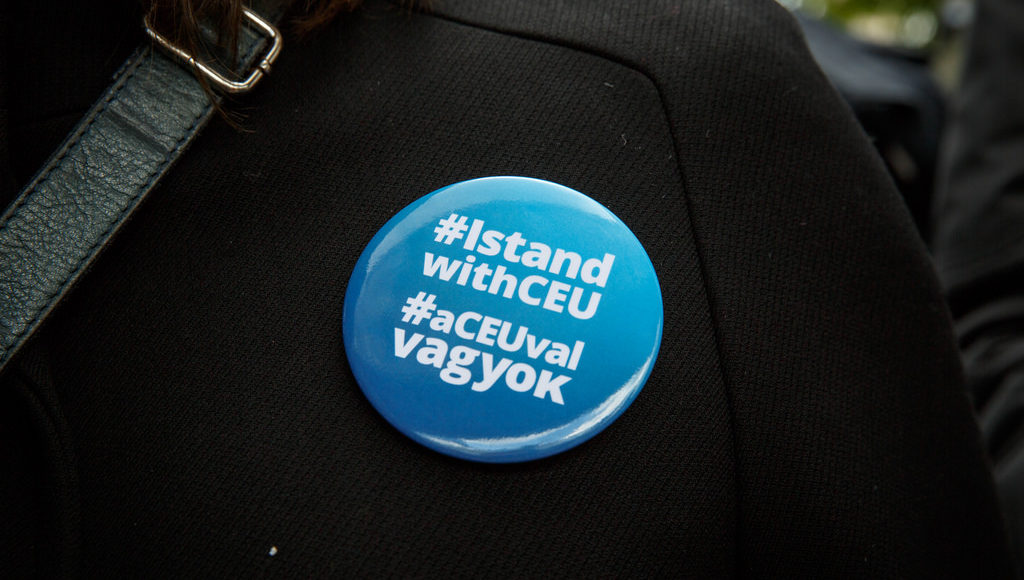Why, Orbán, Why?

Pembroke College, Oxford, 1989. Viktor Orbán has just left Hungary to study Political Science in England, hoping for the best outcomes for his political dreams. He had spent the previous 26 years of his life in Hungary, growing up in a village, and later studying in a fairly small town nearby. The opportunity to study politics in one of the best universities in the world probably seemed out of reach to him, until he received a scholarship by the Soros foundation. With the valuable knowledge he gained abroad, Orbán returned to Hungary a year later soon to become the leader of Fidesz (Alliance of Young Democrats). Less than a decade later, he was elected Prime Minister and then remained as leader of the opposition until his re-election in 2010. Perhaps this landslide rise to power was what shielded the world from his true colours. Soon after his reelection, Orbán swiftly began consolidating control of Hungary, attacking the courts, changing the country’s constitution, and dubbing his government an “illiberal democracy”.

While Viktor Orbán was getting his education at Oxford and then rising to power in Hungary, George Soros, a Hungarian-born billionaire, founded the Central European University in the hopes that this institution, modelled after the educational style of the West, would help instruct the new generation of students in Central and Eastern Europe following the USSR’s collapse. It was envisioned as a beacon of democracy and hope, a means to smoothly bring in Western values of freedom, rights, and equality beyond the Iron Curtain, while safeguarding the cultures of the region.
More than two decades later, the CEU is considered among the top universities in Hungary, with more than 1,500 enrolled students from more than 100 countries. Perhaps what truly puts this university on the map, however, is the fact that it has become the first and only university to be forced out of an EU member state.
In April of 2017, Orbán’s government passed a law stating that foreign universities can only run in Hungary if they have a campus in their home country and if the government had a bilateral agreement with said country regarding the university. The CEU, cautious of this new law, opened facilities at Bard College, NY, in the University’s home country. In a rather unexpected turn of events, however, the Hungarian government did not accept this new arrangement, claiming that the university was not complying with the law (the government never mentioned what these illegal activities were). The law on foreign universities was soon to be colloquially named “Lex CEU”, due to its obvious reason for existence – to kick the CEU out of Hungary, by whatever means necessary.
Continued pressure from the Hungarian government eventually caused Soros and the CEU to cave in, as they announced during the fall that they would be moving their institution’s US-accredited courses to Vienna. Perhaps it was for the protection of their staff and students, or simply because the CEU did not want to get in trouble with an increasingly authoritarian regime. Whatever the cause, as the university’s president and rector Michael Ignatieff announced, “CEU has been forced out. This is unprecedented. A US institution has been driven out of a country that is a NATO ally. A European institution has been ousted from a member state of the EU.”
Why is Orbán biting the hand that once fed him? Soros’ foundation provided Orbán with a world-renowned diploma, yet, two decades later, he has come back to kick Soros’ good-will out of Hungary.
The CEU is a symbol of the West, of democracy and liberal thought, in Hungary. Its aim in educating its students in such principles as freedom of speech, equality, and openness plays a significant role in the future not only of CEU’s students but of Hungarian society as a whole. These values, however, clash radically with the “illiberal democracy” Orbán is establishing in his country, and he cannot risk such striking differences in ideology spreading to his voters.
Beyond Orbán’s general fight against the principles of liberal democracy lies his personal fight with Soros. Since his re-election in 2010, the Prime Minister of the declining Hungarian democracy has been increasingly critical of Soros’ mere existence. Could it be because of his Jewish identity and the parallel rise of anti-Semitism in Europe, or do the issues stem back to his grand philanthropic and highly tolerant project? Orbán has christened Soros his ironic anti-Christ in his propaganda, displaying his face on posters and billboards spread across the country with slogans calling him an enemy of the state, and announcing a “Stop Soros” governmental agenda, with a 25% tax on organizations helping immigrants and refugees. The story weaved by the Fidesz government reminds one of an alternate universe, a dystopian Hungary: while Soros’ openness to “illegal” refugees and to those in need would supposedly drive Hungary to the ground, Orbán’s firm nationalistic stance is what will allow Hungary to surpass its fellow EU states. While Soros’ generous donations and educative visions would poison the minds of the Hungarian youth with progressive philosophies, Orbán’s attack on democratic education will permit Hungary to enter the new era of “illiberal democracy”, where freedom is but a Western fairytale.

Many do not see this merely as an attack on Soros, as much as an attack to democracy in its core. As Orbán began taking control of the Hungarian state one step at a time, he attacked the key institutions of democracy first: the courts and education. After many years of relative freedom, Orbán’s attack on the one university he did not have direct control over due to its foreign allegiances, marked a definitive fall into authoritarianism. Education is seen by many great minds of democracy as the key to building a truly democratic and free society. Jean-Jacques Rousseau, for example, explored two key ways of protecting freedom and democracy in a community. The first was the creation of institutions which would allow for the co-existence of free and equal citizens who would hold their own sovereign power, such as the courts. Orbán fell nothing short of ripping these institutions apart. Secondly, Rousseau recognized the importance of educating children, of building autonomy and sentiments of freedom, while at the same time evading the growth of ideologies of self-interest and nationalism. With his attack on education, Orbán has ripped his “children” of the essential opportunity of such an education, sowing the field for a society prone to, and even attracted to, authoritarian rule.
During his time in Oxford, Orbán was taught by a Hegelian political philosopher. Surely, then, Orbán would have been exposed to Hegel’s views on education as well: “In its character as a universal family, civil society has the right and duty of superintending and influencing education, inasmuch as education bears upon the child’s capacity to become a member of society.” Tightened control of academic life and of educational ideologies and practices goes against the theoretical democratic ways of education. An undemocratic education leads to undemocratic citizens, and thus to undemocratic countries. Orbán’s attack on the CEU goes beyond a mere clash of ideologies and his paradoxical hate of Soros; it is a stab straight into the heart of democracy.
Orbán’s attack on democracy should not be left unchallenged. Indeed, from the last week of November 2018, in a desperate cry to save their university’s campus in Budapest, students from the CEU began mass protests in the capital of Hungary. Anguished for a last-minute change of mind on Orbán’s part, students and staff members from universities across the country joined to protest this attack on higher education. In a symbolic move, the protesters joined outside in the cold, in front of the Hungarian Parliament, holding classes during the day, and keeping their spirits up during the night. To their disappointment, however, Orbán is of a decisive mind, and no sign of alteration to the law has been made to date.
The fight for democracy is not a fight that students and professors have to fight alone. Democracy is a system that has to be protected by all those taking a part in it across the world. Yet in the case of Hungary, the world seems reluctant to take a definitive step towards stifling the growth of authoritarianism.

Hungary is a member state of the EU, meaning that this supranational institution should be able to step in and cut Orbán’s plans short. The European Commission recently stated that it was “deeply concerned” by CEU’s choice to succumb to Orbán’s attack and to move to Vienna, and at the same time criticized the law against the CEU as “disproportionally restrict[ing] EU and non-EU universities in their operations and need[ing] to be brought back in line with EU law”. The European Commission launched a European Court of Justice case in December 2017 against Hungary over its education law; however, due to the complicated voting systems of the EU, it was not able to launch infringement proceedings against the country. The EU does not have a functional system of penalizing or sanctioning countries that go against the EU’s laws; therefore, when it comes to domestic politics of a country governed by parties such as Fidesz, the EU’s “stern parental talks” in the form of suspending rights of membership, but not membership in itself or financial sanctions, do little in putting the countries back on the right track. Even when threatened with the suspension of the country’s voting rights, Orbán did not, even momentarily, alter his views. Furthermore, Orbán is a member of the European Parliament’s European People’s Party (EPP), allowing him and people of similar ideologies to have a say in the decisions made by the EU. The EPP does not plan to expel Orbán from their party, and the EU can do nothing about this. Perhaps this is due to the inherent characteristic of democracy in itself, in which everyone’s ability to express their ideology paradoxically allows for undemocratic sentiments to arise in high places. The EU, strictly upholding democratic values at the supranational level, has found itself falling in an “authoritarian equilibrium”, in which the EU democratically has “just enough partisan politics at the EU level to coddle local autocrats, but not enough to topple them”.

The USA is another key country in this conflict that has been rather lacking in its resolve. The CEU is an American-Hungarian university, with a new campus at Bard College in New York. George Soros himself is of American-Hungarian descent. To be sure, the American ambassador to Hungary upon the eve of the crisis declared that he would do anything in his power to safeguard the university’s standing in Hungary. However, Ambassador Cornstein was nothing but words. In fact, not only did the ambassador fail to talk with Orbán, but he later even turned on his own words, instead echoing Orbán in claiming that the attack on the CEU “doesn’t have anything to do with academic freedom.” He moved on to call Orbán his friend and blamed Soros for not complying with the Hungarian government’s wishes, despite the fact that he promptly moved both the university and his foundation’s offices out of Hungary due to Orbán’s pressure. The US seems to have little interest in the sky-rocketing drop in democratic values in Hungary, but perhaps this may be due to a similar idleness in upholding democratic values on home turf as well.
Michael Ignatieff, the President of the CEU, clearly described the stranded situation the university has found itself in; “This is a dark day for freedom in Hungary and it is a dark day for academic freedom. No leverage has been exerted on the government of Hungary from the outside. That’s where we are. That’s why we have to move this institution and its US-accredited degrees to a location where there is rule of law… Welcome to 2018.”
Orbán’s treacherous attack on education has removed the veil for his grand attack against democracy as a whole, on the abolition of human rights and equality, on the move towards autocracy. Perhaps the world did not make strong enough moves to stop this, but the spark of Orbán’s downfall seems to have been set off.

